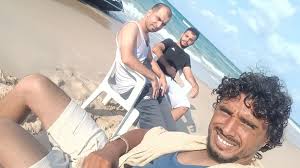A Palestinian migrant, Muhammad Abu Dakha, stunned Europe after escaping Gaza and reaching Italy on a jet ski with the help of ChatGPT.
The 31-year-old’s year-long journey began in April 2024 when he crossed into Egypt after paying smugglers, fleeing the devastation of the Israel-Hamas war that has killed more than 64,000 Palestinians.
After failed attempts to seek asylum in China and multiple setbacks in Libya, he turned to Artificial Intelligence and sheer determination to plot an unusual escape route. Abu Dakha and two companions finally landed on Lampedusa island, rescued just 20 km from the shore after running out of fuel.
Gaza war pushes migrants to risky routes
The nearly two-year Israel-Hamas conflict has left Gaza in ruins, with over 64,000 Palestinians reported killed. In April 2024, Abu Dakha paid $5,000 to cross from Rafah into Egypt, hoping to secure safety for his family. He tried to seek asylum in China, but when that failed, he returned to Egypt via Malaysia and Indonesia.
With no secure path, he turned to Libya, one of the most dangerous hubs for migrants. Human Rights groups and the United Nations say traffickers in Libya routinely abuse and exploit people desperate for a chance to cross. Despite these risks, Italy’s interior ministry reported more than 47,000 migrant arrivals, mainly from Libya and Tunisia this year alone.
ChatGPT helps plot jet ski escape to Lampedusa
After ten failed smuggling attempts, Abu Dakha devised his own plan. He bought a second-hand Yamaha jet ski for about $5,000 through a Libyan marketplace and added $1,500 in survival gear, including GPS, a satellite phone, and life jackets. Two other Palestinians, Diaa (27) and Bassem (23), joined the escape.
The trio attached a dinghy of extra supplies and set off from al-Khoms, Libya, aiming for Italy’s southernmost island. To calculate fuel needs for the 350-km journey, they relied on ChatGPT. The AI tool gave them an estimate that kept them moving for almost 12 hours at sea.
But things didn’t go perfectly; they still ran out of fuel just 20 km from Lampedusa. Using their satellite phone, they called for help and were rescued by a Romanian patrol boat on a Frontex mission.
“It was an arduous journey, but we were adventurers. We had strong hope that we would arrive, and God gave us strength,” Bassem told Reuters. UNHCR Italy confirmed the unusual crossing, noting the reliance on ChatGPT and a jet ski made their case stand out.
From Lampedusa to Germany with hope for family
Italy was their first landing point, but it wasn’t the final destination. After being processed in Lampedusa, the group was transferred to Sicily and later Genoa, but escaped during transport. Abu Dakha then boarded a flight to Brussels and continued by train to Germany, where a relative collected him.
He has since applied for asylum there while living in a centre for asylum seekers. His family, meanwhile, remains in a tent camp in Khan Younis after their home was destroyed.
His father recalls Abu Dakha once ran a comfortable internet shop before the war. Now, Abu Dakha’s priority is to reunite with his wife and two children, aged four and six, one of whom needs urgent medical care.
“That’s why I risked my life on a jet ski,” he said. “Without my family, life has no meaning.”
















